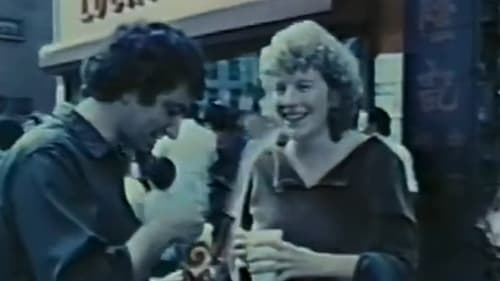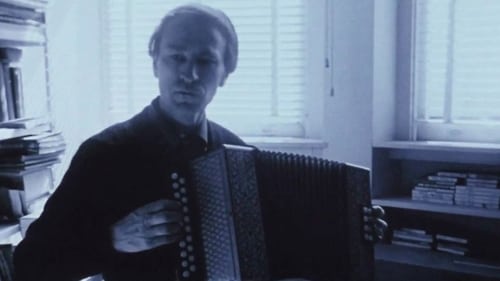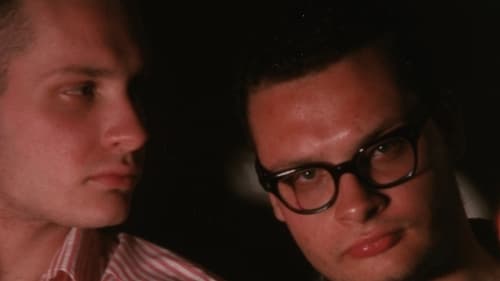Storm De Hirsch
História
Storm de Hirsch (1912–2000) was an American poet and filmmaker. She was a key figure in the New York avant-garde film scene of the 1960s, and one of the founding members of the Film-Makers' Cooperative. Although often overlooked by historians, in recent years she has been recognized as a pioneer of underground cinema.
Description above from the Wikipedia article Storm de Hirsch, licensed under CC-BY-SA, full list of contributors on Wikipedia.

Self
Filmmaker Jonas Mekas films 160 underground film people over four decades.

Director
Geometrics of the Kabbalah (1975) Short film Dir. Storm De Hirsch "5 is water, 5 is the letter X. 5 is distance. 5 says no. 5 laughs when divided into 2. 5 swims backwards, and space is five. The cherry tree is one. The hurt is 1 plus 1, the wish is two. The wonder three. The absence four, and the five is the Universe. The Universe in the head, the universe in the eye, the sky and the waterdrop."–from Brook 16, "Source Books of Storm De Hirsch," 9/24/66.

Director
"Reflections on a haunted cove along the banks of the Hudson River." –S.D.H.

Director
"Cine-Sonnet. Rome to Venice. A study of time in motion. An accelerated montage of reflections and landscapes framed in the window of an express train running from Rome to Venice. Dedicated to the writings of J.W. Dunne, the collage of Kurt Schwitters and the cubistic paintings of Braque." –S.D.H.

Director
"A day stands still and can be seen sprouting from its socket, a long toothed day eats its quiet bread and stands as still as ears of corn drying in the sun. It is a day to spread out like a festive cloth and heap with fruits. It is a day to carry in one's arms and lie with under the umbrella of a blossom tree." –S.D.H.

Director
"Tonight is a snowbird with heart hung hostage in a water drop, its iceflaked starfeet remembering the gargoyle's empty threat to drown in rivulets of melting feather frost." –S.D.H.

Director
"Cine-Sonnet. The film-maker's impressions of Charlotte Moorman's 9th Avant-Garde Festival of the Arts aboard the old steamboat, 'Alexander Hamilton,' docked at the South Street Seaport

Director
"The shape of change, the shape of memory has walked many miles in the mind to recreate a landscape, a manner of subterranean speech which may never reach its destination to the surface but roolls in the bloodstream swollen with speech invisible to the ear but palpable to the feelings that travel inside the network of the body/brain. The vision and the visitation occur simultaneously."–S.D.H.

Director
Children of the water world drift the ocean in an empty crystal ball, swim in beaded beds of mist, and spawn in pools of murder to see a lantern sunk in the pit of an empty space.

Self
An epic portrait of the New York avant-garde art scene of the 60s.

Director
Six films in one reel: The Reticule of Love; The Recurring Dream; Aristotle; Malevitch at the Guggenheim; Silently, Bearing Totem of a Bird; Ives House: Woodstock.

Director
“Third Eye Butterfly” is a double 16mm projection piece in which the two screens – at times divided within into additional “mini-screens” causing textured kaleidoscopic effects – blur to create a third wider frame, encouraging the viewers to extend their vision beyond ordinary sight - Microscope Gallery

Director
Dedicated to all the magic makers of the world who weave a talisman for man's rebirth in his house of breath.

Director
An Angry Arts "protestfilm" with black and white visuals. –S. D. H.

Director
First shown on January 30, 1967, FOR LIFE AGAINST THE WAR was an open-call, collective statement from American independent filmmakers disparate in style and sensibility but united by their opposition to the Vietnam War. Part of the protest festival Week of the Angry Arts, the epic compilation film incorporated minute-long segments which were sent from many corners of the country, spliced together and projected. The original presentation of the works was more of an open forum with no curation or selection, and in 2000 Anthology Film Archives preserved a print featuring around 40 films from over 60 submissions.

Director
Hudson River Diary: Book 1 "Chronicles the journey of a train named Cayuga as it travels from New York to Poughkeepsie. There is something profoundly sentimental as you make the trip. You may never have been to this part of the world but you are concerned and you care about it after you see the film." – Bob Lermann, Today's Filmmaker

Herself
In March and April of 1966, Markopoulos created this filmic portrait of writers and artists from his New York circle, including Parker Tyler, W. H. Auden, Jasper Johns, Susan Sontag, Storm De Hirsch, Jonas Mekas, Allen Ginsberg, and George and Mike Kuchar, most observed in their homes or studios. Filmed in vibrant color, Galaxie pulses with life. It is a masterpiece of in-camera composition and editing, and stands as a vibrant response to Andy Warhol's contemporary Screen Tests.

Director
Eighteenth century Indian miniatures enact a traditional wedding ceremony of a Hindu Prince and Princess. An exotic landscape of the mind; fable-fantasy of childhood-manhood.

Director
Peyote Queen opens with black-and-white perforations that pulsate to the beat of drumming and escalate to light-bathed split screens and kaleidoscopic effects. Switching to lively organ accompaniment, the film pours out a stream of simple scratchings that rollick across the screen. Fish, breasts, flowers, boats, water, lips, hearts, stars—the hieroglyphs explode with color and celebrate the female creative force. The surge slows with the return of ritual drumming, this time with chanting, and a self-reflective coda. -- National Film Preservation Foundation

Two nuns take a bath, then meet a sailor on the Staten Island Ferry.

Director
A newsreel of Jonas Mekas shooting his filmed version of The Brig on the set of the Living Theatre production.

Music
"In Spring, 1963 Show Magazine called me and asked that I make a film on arts in New York. I told them, why did they want me to make it - didn't they know I was a bit unusual? ... 'We want something unusual,' they said. So I went out and made a newsreel on arts. Show people looked at the rough cut of the film and became very angry. 'But there is nothing about Show Magazine and DuPont fabrics in the movie,' they said. 'What has that to do with the arts in New York!' I said. The battle was short. The film was destroyed. Really, I have no idea what they did with it. This workprint of the first FILM MAGAZINE OF THE ARTS is the only print in existence, as far as I know." -- J.M.

Director
super-8 / color / silent

Director
"Metaphysical sketches of my stay at the Neil Ives house in Woodstock where the artist lived and painted" — S.D.H. Film 6 of 6 in the Cine-Songs Program.

Director
"Homage to the life and works of Kasimir Malevich" — S.D.H. Film 4 of 6 in the Cine-Songs Program.

Director
"De Hirsch's Aristotle is a succinctly percussive appreciation of the visual rhythms of a country stream." Film 3 of 6 in the Cine-Songs Program.

Director
Film 2 of 6 in the Cine-Songs Program.

Editor
A dramatic feature shot on location in Rome. Centered around the adventures and illusions of three girls living abroad, the film explores their restlessness and personal involvements in assuming the role of woman as hunter.

Producer
A dramatic feature shot on location in Rome. Centered around the adventures and illusions of three girls living abroad, the film explores their restlessness and personal involvements in assuming the role of woman as hunter.

Writer
A dramatic feature shot on location in Rome. Centered around the adventures and illusions of three girls living abroad, the film explores their restlessness and personal involvements in assuming the role of woman as hunter.

Director
A dramatic feature shot on location in Rome. Centered around the adventures and illusions of three girls living abroad, the film explores their restlessness and personal involvements in assuming the role of woman as hunter.

Director
"I wanted badly to make an animated short and had no camera available. I did have some old, unused film stock and several roles of 16mm sound tape. So I used that- plus a variety of of discarded surgical instruments and the sharp edge of a screwdriver- by cutting, etching, and painting directly on both film and tape."

Director
Zero are the violated, zero the redeemed, zero always in the round, molested by computation of an ache, a threat of hangman's thread or ballad dangling from the eye. –S. D. H.

Director
Film 1 of 6 in the Cine-Songs Program.

Director
Film 5 of 6 in the Cine-Songs Program.







